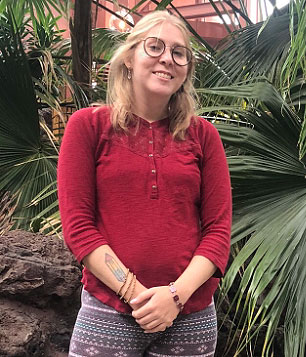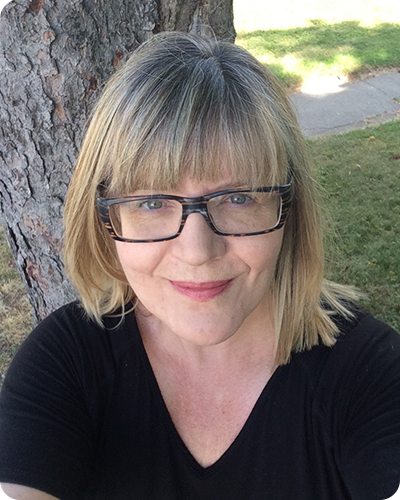What is It Like Living with Schizophrenia?

Subscribe to Catalyst
Subscribe to get our magazine delivered right to your inbox
Related Articles
Subscribe to Catalyst
Subscribe to get our magazine delivered right to your inbox
Related Articles
At 26, Gillian Corsiatto of Red Deer, Alta., is a published author – her debut novel, Duck Light, asks the serious question: “How can one break free of societal expectations?” More books and plays are underway. She’s also been a keen improv performer with Bullskit Comedy.

Gillian Corsiatto
She has three part-time jobs: She is a community educator and youth group leader for the Red Deer branch of the Schizophrenia Society of Alberta and has been a guest speaker for The Mental Health Commission of Canada’s Headstrong youth program; she manages social media and recruitment for the Red Deer Royals marching band (in which she used to play the tuba); and most recently, she has taken a job wrapping and packaging caramels for a small, home-based business.
It sounds like a busy life, but Corsiatto understands the importance of managing stress. “It’s not like 9 to 5. I make sure I have enough time to rest and enough time for myself at home,” she says.
If you have never met a person who lives with schizophrenia – you just did.
Corsiatto is among more than 147,500 Canadians who deal with schizophrenia, a severe mental illness.
New standards
To ensure those living with the condition experience better outcomes and have the kind of hope for the future that Corsiatto does, The Mental Health Commission of Canada, in partnership with Ontario Shores Centre for Health Sciences, has released the Schizophrenia Quality Standards National Demonstration Project, a synthesis of the best medical evidence, with four demonstration health sites across Canada: Adult Forensic Mental Health Services, Manitoba; Hotel-Dieu Grace Health Care and Canadian Mental Health Association, Windsor, Ont.; Newfoundland and Labrador Health Services; and, Seven Oaks Tertiary, B.C. Health practitioners will receive education and training on best practices in therapy and medication treatments and helping patients and their families cope with the illness over the long term.
This will come as a welcome relief to many. The symptoms of schizophrenia tend to arise in adolescence or young adulthood, as they did for Corsiatto, who says she was about 13 when she first experienced delusions.
Early symptoms
“I thought I saw dead people,” she says. “I found it very hard to pay attention in school, and socially I was not really fitting in with the other kids because of my odd behaviour and the things I would talk about. That’s when I started hallucinating. I was very much in my own world at that point.” Corsiatto says she also engaged in self-harm to relieve her psychological turmoil.
Overcoming her psychosis and other symptoms wasn’t easy. At 14, she spent time in a psychiatric ward, where she received medication and was monitored for improvement in her symptoms. This helped eventually, she says, but the medication had side effects. “I was so tired all the time. And there was hunger. I ended up gaining a lot of weight.” She also remembers that some caregivers had the attitude that their patients needed to be disciplined and corrected.
“We were treated as though we were bad kids, not sick kids. Like it was all behaviour problems, causing trouble. I’m an adult now and can stand up for myself, but I wish I would have said something or stood up because I really felt like I wasn’t being treated very well.”
Corsiatto’s symptoms did improve significantly though, with therapy and medication. Throughout most of high school, she did not have hallucinations and was able to manage her studies and extra-curricular activities. She even went off her medication for a time, but that did not last. After graduating high school, she went to Red Deer College (now Polytechnic), majoring in music. “School was stressful. I didn’t complete the program,” she says. Along with medication she had previously been given for anxiety, she resumed taking medication for psychosis. This was a hard period, says Corsiatto. “I just coped with it.”
The next chapter
Gradually, though, the medication and therapy again helped and for the past four years, Corsiatto has been able to build a life she enjoys, with a desire to help other young people with severe mental illness and a lot of hope for the future. “I really want to make writing a career,” she says, as she works on the sequel to Duck Light.
“I know that there’s hope for the future, and I know that I will always deal with this illness and this schizophrenia, but I also know that I can manage it, and I am more than my schizophrenia, and if things do get bad, I know what to do about it.”
For example, she says hallucinations and delusions are still something she experiences, “but to a much lesser extent than I used to,” Corsiatto says. “Several factors impact whether or not I recognize them as such. Medication is definitely a big part, but I also credit life experience. I have learned to gauge the reactions of others or, if I’m with someone I trust, asking them what they are experiencing in that moment. If I am out in public and experiencing a hallucination and no one else around me seems to notice or react to it, that’s a good indicator to me that it’s a hallucination. Things that will make it harder to decipher whether real or not are stress, lack of sleep, or if I am alone.”
She sees ways the mental health system can improve its treatment of young people with schizophrenia, and notes that a significant number of people with mental illness also struggle with substance use issues, finding suitable housing, and waiting lists for treatment. “It’s case by case. I’m on a waiting list for an autism assessment, but I feel that if I go to the hospital, I can get help pretty fast. If I need an emergency appointment with my psychiatrist, I can do that.”
Individual experiences
Corsiatto wants people to know that no two people with schizophrenia experience it the same way. If you want to know what someone is going through, “talk to the individual, don’t generalize,” she says.
For young people going through treatment for schizophrenia, she says, “It’s not all about the medications and the illness. It’s really important to focus on what makes you happy. What do you like to do? What are you proud of? What would you like to achieve?”
Answering these questions for herself has made Corsiatto feel like she’s “living the dream.”
Each time she speaks publicly, she feels she’s dispelling misconceptions. “I love changing people’s mindsets about what they think schizophrenia is. ‘This is how someone with schizophrenia is going to act.’ And then I show up. And they think this person is pretty normal. So, I love that. And changing the way people think about interacting with schizophrenia and people with schizophrenia. They can just talk to me like I’m a normal person – because I am.”
Resource: Where to Get Care – A Guide to Navigating Public and Private Mental Health Services in Canada.
Resource: Addressing stigma in health care.

Moira Farr
An award-winning journalist, author, and instructor, with degrees from Ryerson and the University of Toronto. Her writing has appeared in The Walrus, Canadian Geographic, Chatelaine, The Globe and Mail and more, covering topics like the environment, mental health, and gender issues. When she’s not teaching or editing, Moira freelances as a writer, having also served as a faculty editor in the Literary Journalism Program at The Banff Centre for the Arts.




